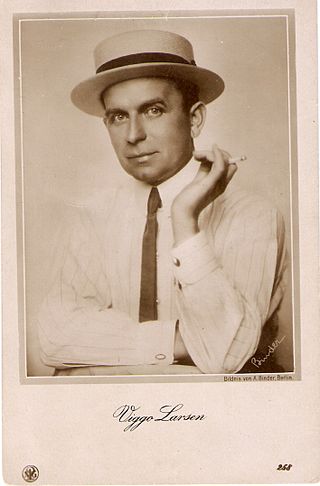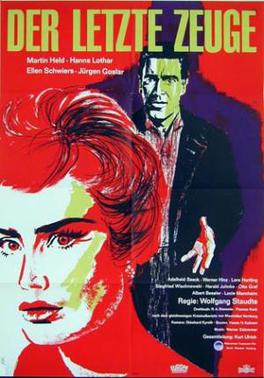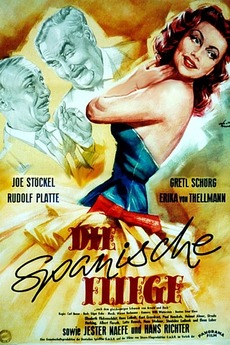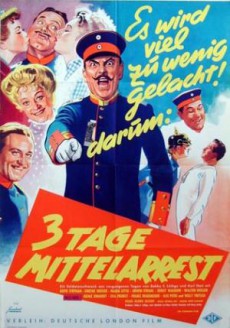
Ewald André Dupont was a German film director, one of the pioneers of the German film industry. He was often credited as E. A. Dupont.

Variety is a 1925 German silent drama film directed by Ewald Andre Dupont based on the 1912 novel The Oath of Stephan Huller by Felix Hollaender.

Viggo Larsen was a Danish film actor, director and producer from the early silent era to the 'talkies'. He appeared in 140 films between 1906 and 1942. He also directed 235 films between 1906 and 1921. He was born and died in Copenhagen, Denmark. He has been criticized for having starred in the 1942 Nazi-propaganda movie G.P.U.

The Last Witness is a 1960 West German crime film directed by Wolfgang Staudte and starring Martin Held, Hanns Lothar and Ellen Schwiers. It was entered into the 1961 Cannes Film Festival. It was shot at the Spandau Studios in Berlin. The film's sets were designed by the art director Hans Kuhnert.

Waldrausch is a 1977 West German drama film directed by Horst Hächler and starring Uschi Glas, Alexander Stephan and Siegfried Rauch. A farmer tries to block the ambitious plans of an architect to build a new dam and flood a valley. It was based on the 1907 novel Waldrausch by Ludwig Ganghofer.

The Sinful Village is a 1966 West German comedy film directed by Werner Jacobs and starring Michl Lang, Marianne Lindner and Gunther Philipp. It was based on the play Das sündige Dorf by Max Neal which had previously been made into a 1940 film of the same title.

Hanni Weisse was a German stage and film actress. She appeared in 146 films between 1912 and 1942.

Silence in the Forest is a 1976 West German historical drama film directed by Alfred Vohrer and starring Alexander Stephan, Belinda Mayne and Evelyn Opela.

The Spanish Fly is a 1955 West German comedy film directed by Carl Boese and starring Joe Stöckel, Erika von Thellmann and Rudolf Platte. It was shot at the Göttingen Studios with sets designed by the art director Ernst Klose. It was based on the 1913 play The Spanish Fly by Franz Arnold and Ernst Bach. A previous adaptation had been released in 1931.

Three Days Confined to Barracks is a 1955 West German comedy film directed by Georg Jacoby and starring Ernst Waldow, Grethe Weiser and Eva Probst. It was shot at the Wandsbek Studios in Hamburg. The film's sets were designed by Erich Kettelhut and Johannes Ott. It is a remake of the 1930 comedy film Three Days Confined to Barracks. Like its predecessor it is a comic portrayal of life in the German Army at the beginning of the century.

The Uncle from America is a 1953 West German comedy film directed by Carl Boese and starring Hans Moser, Georg Thomalla and Joe Stöckel. It was based on a play by Ferdinand Altenkirch which had previously been made into the 1932 film No Money Needed. It was shot at the Spandau Studios in Berlin. The film's sets were designed by the art director Erich Grave and Walter Kutz.

Felix Hollaender was a German writer, critic, dramaturge and theatre director. At one point he worked as a stage producer with his friend Max Reinhardt.

Wanda Treumann was a German theatre and film actress and film producer of the silent era. A leading lady in a number of productions during the Imperial era and the Weimar Republic, she retired from the screen in 1922. Her later life remains obscure.

The Oath of Stephan Huller is a 1921 German silent drama film directed by Reinhard Bruck and starring Anton Edthofer, Hanni Weisse and Alexander Areuss. It is based on the 1912 novel of the same title by Felix Hollaender.
Kean, ou Désordre et génie is an 1836 play by the French writer Alexandre Dumas.

The Oath of Stephan Huller is a 1912 German silent drama film directed by Viggo Larsen and starring Larsen and Wanda Treumann. It is an adaptation of the 1912 novel of the same title by Felix Hollaender.

Variety is a 1935 French-German drama film directed by Nicolas Farkas and starring Annabella, Hans Albers and Attila Hörbiger. It is based on the 1912 novel The Oath of Stephan Huller by Felix Hollaender. It features a love triangle between three performers of a high wire act.

Three from Variety is a 1954 West German drama film directed by Kurt Neumann and starring Ingrid Andree, Peter Pasetti and Paul Dahlke. It is based on the 1912 novel The Oath of Stephan Huller by Felix Hollaender which has inspired a number of film adaptations. The plot revolves around a love triangle around a high wire circus act.
The Oath of Stephan Huller may refer to:

Atlantis is a 1930 drama film directed by Ewald André Dupont and Jean Kemm and starring Maxime Desjardins, Alice Field and Constant Rémy. The film was made as French version of the British film Atlantic, produced by British International Pictures at Elstree Studios. Such Multiple-language versions were common in the early years of sound before dubbing became a more established practice. Like the original version it is based on the 1929 West End play The Berg by Ernest Raymond.


















